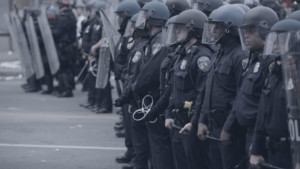Policing the Police
 Could Ferguson Win Its Case Against the Justice Department?
Could Ferguson Win Its Case Against the Justice Department?
February 11, 2016/ Sarah Childress
A few weeks ago, it seemed like Ferguson, Mo. might actually enter into an agreement to overhaul its police and city court.
City officials had reached a tentative agreement with the Justice Department in January to implement widespread reforms, including retraining police officers, restructuring the city court and removing rules in the city code that police had used almost exclusively to penalize African-Americans.
Now, change in the city that helped give rise to the Black Lives Matter movement following the police shooting death of 18-year-old African-American Michael Brown will come much more slowly, if at all.
On Tuesday, Ferguson’s city council voted 6-0 to amend the deal, removing mandates for salary increases for its officers and an increase in staffing for the city jail.
Less than 24 hours later, Attorney General Loretta Lynch announced that the Justice Department had filed a complaint in court against the city, alleging a pattern or practice of civil-rights violations that were, she said, “not only egregious — they were routine.”
“The residents of Ferguson have waited nearly a year for their city to adopt an agreement that would protect their rights and keep them safe,” she said. “But as our report made clear, the residents of Ferguson have suffered the deprivation of their constitutional rights — the rights guaranteed to all Americans — for decades. They have waited decades for justice. They should not be forced to wait any longer.”
Usually, cities facing a court-enforceable agreement with the Department of Justice choose to sign onto reforms rather than risk fighting the federal government in court. So far, the DOJ has entered into 33 agreements with police departments nationwide — 15 of which are currently in progress. But only two departments — Columbus, Ohio and Alamance County, N.C. — have managed to take on the Justice Department in court and get away without a reform agreement.
Two Failed Attempts at Reform
The first legal challenge to the Justice Department’s authority to reform police departments came in 1999 in Columbus, where federal officials alleged that police were engaged in a pattern or practice of excessive force, making false arrests and lodging false charges, and conducting improper searches and seizures. The DOJ said that black, young female or low-income white residents were the targets of police misconduct when they very often had done nothing wrong.
The Columbus police, backed with funds gathered by the local police union, took the case to court. Rather than risk setting a precedent that could have weakened the pattern or practice statute, the Justice Department ultimately dropped the suit, acknowledging that police had instituted some reforms, and closed the case.
Sgt. Rich Weiner, a department spokesman, told FRONTLINE recently that the police viewed the outcome as a victory.
“The fact of the matter was, there was not a pattern of biased-based profiling or anything like that,” he said. “We felt like the government was coming in here and simply trying to bully us. We were doing the job right.”
In Alamance County, the DOJ charged that the sheriff, Terry Johnson, had fostered a culture of discriminatory policing against Latinos, stemming in part from offensive remarks he allegedly made. But in August 2015, a federal court ruled that the Justice Department failed to prove the sheriff and his deputies had a pattern or practice of civil-rights violations.
The DOJ is currently appealing the decision, its first loss in such a suit.
The department is also currently arguing a case against Colorado City, Ariz. and Hildale, Utah. Both cities are predominantly composed of members of the Fundamentalist Church of Jesus Christ of Latter-Day Saints. The Justice Department says the cities discriminate against those who aren’t members of the church, and use their joint police department — the marshal’s office — to enforce these practices. The cities deny the charges, and have countered that federal officials targeted them because they don’t approve of their religion. The case is ongoing.
The Case Against Ferguson
In Ferguson, the charges are much broader than the discriminatory policing charges in Alamance or even the civil-rights violations in Columbus.
Federal officials allege that Ferguson police violated the Fourth Amendment by stopping people without reasonable suspicion, arresting them without cause and using unreasonable force against them. They also said that police were encouraged to take these steps to raise revenue for the city, driven in part by racial bias.
But the loss in Alamance highlights the risk federal officials could face in a lawsuit against Ferguson.
“That case illustrates just how hard it is to define what it means to have a pattern or practice of misconduct, and for the DOJ to document that to the level of certainty that the court’s going to demand,” said Stephen Rushin, an assistant professor at the University of Alabama Law School, and an expert on police reform.
Rushin said that federal officials seem to have a stronger case in Ferguson. DOJ investigators have drawn on city documents to bolster their discrimination case, and cited statistical support for their claims of routine violations of black residents’ civil rights.
For example, the DOJ said it found that black drivers were more than twice as likely as white drivers to be searched during traffic stops, but 26 percent less likely than whites to be found with contraband. Even so, black drivers were more likely to be cited and arrested during a traffic stop.
The report also found that 88 percent of documented police use-of-force cases involved blacks, and in particular juveniles and people with mental health problems or cognitive disabilities.
“We intend to aggressively prosecute this case and I have no doubt that we will prevail,” Lynch said on Wednesday.
Ferguson city officials didn’t immediately respond to requests for comment about the lawsuit. Previously, Mayor James Knowles III acknowledged problems within the department, but questioned whether there was a pattern of discrimination.
City council officials have said they are open to reforms in principle, but they’ve expressed reservations about how to fund them. With a budget of $25 million, the city is currently operating at $6 million deficit. An assessment by Ferguson officials estimated that reforms could cost as much as $3.7 million in the first year alone, with the deal to remain in place for at least five years.
“The general perception has been that the city has the most to lose by going to trial, but Ferguson is a small town,” Rushin said. “They might be facing serious budgetary shortfalls if they accept the terms of the [agreement], and given the recent example of Alamance, if they get a favorable district court judge — maybe they are better off challenging it in court.”
Categorized: 2015-2016 - Artikel - Racial Profiling Tagged: Ferguson - Ferguson police - Policing the Police - USA

